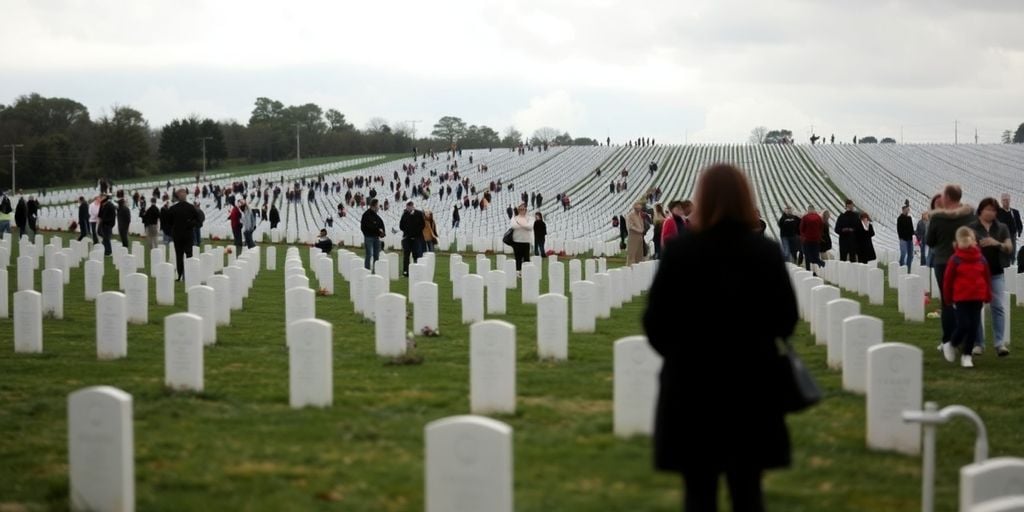Bosnia is commemorating the 30th anniversary of the Srebrenica massacre, a genocide that claimed the lives of over 8,000 Bosniak Muslim men and boys. Thousands gathered to honor the victims, with seven newly identified individuals being laid to rest in a collective funeral. This somber occasion highlights the ongoing search for victims and the enduring impact of the 1995 atrocities, recognized as Europe’s worst genocide since World War II.
Remembering Srebrenica: A Day of Mourning and Remembrance
Thousands converged in Srebrenica to mark three decades since the horrific events of July 1995. The commemoration included the burial of seven newly identified victims, including two 19-year-old men, who were laid to rest alongside over 6,000 others. These annual burials underscore the persistent efforts to identify and honor those lost, as victims continue to be unearthed from numerous mass graves.
- Key Takeaways:
- 30th anniversary of the Srebrenica massacre observed.
- Seven newly identified victims buried.
- Over 8,000 Bosniak Muslim men and boys killed in 1995.
- Srebrenica recognized as Europe’s only genocide since WWII.
The Pain of Partial Burials and Lingering Scars
For many families, the process of mourning is complicated by the fact that victims are often found in fragmented states, scattered across multiple mass graves. Mirzeta Karic, awaiting the burial of her father, expressed the profound grief of interring only a portion of a loved one. "Thirty years of search and we are burying a bone," she lamented, highlighting the deep emotional toll on survivors who continue to grapple with the incomplete recovery of their family members.
Historical Context and Ongoing Denial
The massacre began on July 11, 1995, when Bosnian Serb fighters overran the U.N.-designated safe area of Srebrenica. In the ensuing days, thousands of Bosniak Muslim men and boys were systematically executed and buried in mass graves, with efforts made to conceal the evidence. Despite rulings by international courts and convictions of key figures like Radovan Karadžić and Ratko Mladić, Bosnian Serb leadership and neighboring Serbia continue to dispute the classification of the events as genocide. Serbia’s President Aleksandar Vucic offered condolences, calling it a "terrible crime" but stopping short of acknowledging genocide.
The Battle for Memory and Education
Thirty years on, the memory of Srebrenica remains a contentious issue, particularly within Bosnia-Herzegovina’s fragmented educational system. Historical revisionism is prevalent, with different ethnic groups taught divergent narratives of the war. In some regions, textbooks portray convicted war criminals as heroes, omitting or downplaying the genocide. This divergence in historical accounts fuels mistrust and division among ethnic groups, hindering reconciliation efforts. The Srebrenica Memorial Center has also faced challenges, including temporary closures due to security concerns, reflecting the fragility of peace and the ongoing struggle to preserve historical truth.
Sources
- Page Unavailable – ABC News, ABC News – Breaking News, Latest News and Videos.
- Thousands in Srebrenica on 30th anniversary of Europe’s only genocide since WWII, ABC News.
- Srebrenica, a Massacre Foretold, Still Casts Its Shadow, The New York Times.
- Srebrenica, 30 Years Later: The Battle for Memory in Bosnia-Herzegovina, New Lines Magazine.
- Bosnian Serb Commander’s Srebrenica Acquittal Decried as ‘Dangerous Precedent’, Balkan Insight.


![A Nation Mourns: Thousands Bid Farewell to Folk Legend Halid Beslic Thousands mourn folk legend [Halid Beslic] at his funeral.](https://balkaneu.com/wp-content/uploads/2025/10/d4a6f2dfthumbnail-218x150.jpeg)



